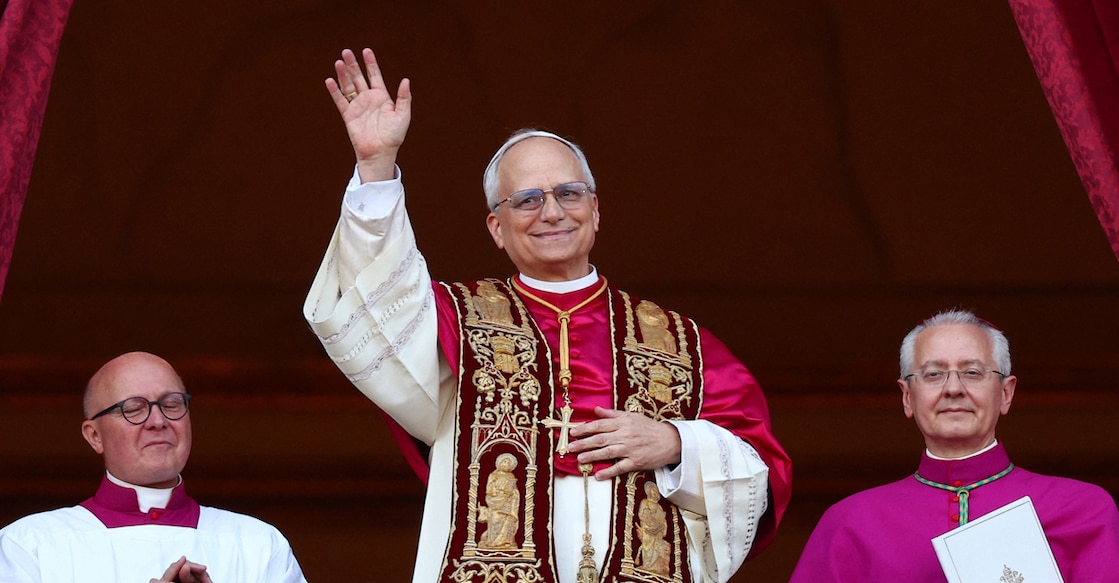‘Peace be with all of you’: Pope Leo XIV’s first message to the world

Mail This Article
"Peace be with all of you," Pope Leo XIV said from the balcony of St. Peter's Basilica on Thursday, in his first public words. US Cardinal Robert Prevost was elected pope by the world's cardinals on the second day of the conclave. He is the first American pontiff.
On Thursday, White smoke rose from the Sistine Chapel, and the bells of St. Peter's rang out, signalling that cardinals had elected a new pope to succeed Pope Francis.
Cardinal Robert Francis Prevost (69) from Chicago has been elected the Supreme Pontiff to lead the Roman Catholic Church. Prevost is the head of the church's Dicastery for Bishops. The powerful position means he oversees the selection of new bishops.
For any cardinal electors who may be turned off by Prevost's American nationality, it's not his only one. He's a dual citizen, holding nationality in both the US and Peru, where he served for many years.
While Prevost is seen overall as a centrist, on some key social issues he's viewed as progressive. He has long embraced marginalized groups, a lot like Francis, who championed migrants and the poor.
But, also like Pope Francis, the Illinois native opposes ordaining women as deacons, for instance, so on that point he's seen as conservative on church doctrine.
The election came on the first full day of voting by the 133 cardinal electors, who secluded themselves behind the Vatican's medieval walls on Wednesday afternoon.
A joyous crowd in St. Peter's Square cheered and applauded as the first wisps of smoke emerged from a small chimney on the roof of the Sistine Chapel, where the cardinals have been holding their secret ballot.
The identity of the pope and the name he has chosen as pontiff will be announced to the world from the central balcony of St. Peter's Basilica shortly. The new pope will then step forward to deliver his first public address and blessing to the gathered crowds.
Pope Francis died on April 21 after ruling the 1.4-billion member Church for 12 years. During his reign he sought to open up the staid institution to the modern world, enacting a range of reforms and allowing debate on divisive issues such as women's ordination and better inclusion of LGBT Catholics.
While no clear favourites had emerged to succeed him, Italian Cardinal Pietro Parolin, who served as the Vatican's number two under Francis, and Filipino Cardinal Luis Antonio Tagle were considered the frontrunners.
Other "papabili" - potential papal candidates in Italian - were France's Jean-Marc Aveline, Hungary's Peter Erdo, American Robert Prevost, Italy's Pierbattista Pizzaballa and Filipino Pablo Virgilio David. The cardinals will have had to decide whether to pick someone to build on Francis' vision of greater openness and reform, or else choose a more conservative figure.
During the conclave, their only communication with the outside world was through the smoke emerging from the chimney - black for no pope yet picked, white signalling a new pontiff chosen by a majority of at least two-thirds.
The cardinals held an initial inconclusive vote on Wednesday evening and a further two followed on Thursday morning. They returned to the Sistine Chapel at 4 pm (1400 GMT) and at around 6.08 pm (1608 GMT) the white smoke emerged.
During the conclave, cardinals were sequestered from the world and sworn to secrecy, their phones and computers confiscated, while they were shuttled between the Sistine Chapel for voting and two Vatican guesthouses to sleep and dine.
The average number of ballots it has taken to be elected over the past 10 conclaves was 7.2. Francis was elected after five in 2013.

